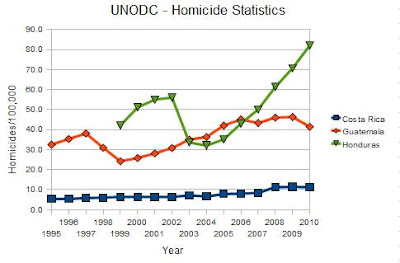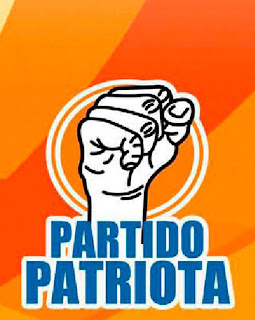Otto Pérez Molina (Partido Patriota) won the 2011 presidential elections in Guatemala with 53.74% of the votes and voter turnout 60.83% in the second round. He beat Manuel Baldizón (Libertad Democrática Renovada, LIDER, a centrist political party founded in 2010), who got a 46.26% of the votes. Security, combating violence, impunity and social programs played an important role in the campaigns. To be able to interpret the new situation in Guatemala we have to look at Guatemala's history and study the past of Otto Pérez Molina...
Causes of Violence in Guatemala
Causes of Violence in Guatemala
 |
| Dwight D. Eisenhower authorized Operation PBSUCCESS |
The UN sponsored Guatemala's Truth and Reconciliation committee (TRC) named the Historical Clarification Commission (Comisión para el Esclarecimiento Histórico, or CEH). CEH presented its report "Guatemala: Memoria del Silencio" in 1999. It had a series of recommendations for the government of which an important one was to establish a "Peace and Harmony Foundation" (Fundación por la Paz y la Concordia), which only task it would be to monitor and guard the fulfillment of the commission's recommendations. Sadly the foundation was never established and most recommendations were never followed up. Crimes of genocide, torture and forced disappearance were not prosecuted, so a lot of resentment and old killing habits remained under the population. Few trials were held though. But trials of Guatemalan militaries like for the murder on bishop Gerardi and the murder on Myrna Mack, were accompanied by threats and attacks against judges, prosecutors, and witnesses, with some killed and others forced into exile. Widespread impunity has become institutionalized and that impunity in itself became a huge booster of violence. Relatives of victims taking the law into their own hands and arrested murderers that were not prosecuted and send home taking revenge on the Police informers, increased the homicide rate severely. The actual prosecution rate for homicide sits at 2 to 3 percent. Today, the number of assassinations per day in Guatemala exceeds the number during the civil war. Also because the civil war had ended in 1995, the US began to send back Guatemalans that had fled their home country. Especially gang-members and other criminals were extradited. Guatemala had a huge influx of English speaking criminals and gang-members who didn't had a job. So lots of new gangs were established and extortion, kidnappings, robberies and drug trades began to flourish. The Mexican Los Zetas cartel, known as the most violent drug cartel to the DEA, got a strong foothold in Guatemala and it is known that it works together with Guatemalan special army forces, Brigada de Fuerzas Especiales "Kaibil".
Pérez and his role during the Civil war
 |
| Jennifer Harbury holding Efraín Bámaca Velásquez |
 |
| Bishop Juan Gerardi |
Pérez and the Partido Patriota
 |
| Otto Pérez Molina with "Mano Dura" |
 |
| Central America - Homicide Statistics (Data UNODC) |
Pérez wouldn't be the first criminal who became president. Portillo, who shot and killed two students in 1980 in Mexico and got away with it, served as a president from 2000-2004, was accused of embezzlement after his term and extradited from Mexico for it, but miraculously absolved by the Guatemalan court in 2011. Portillo was arrested again (thanks to CICIG (UN)) for money laundering and will be extradited to the US hopefully soon.
Pérez' Government Program
 |
| Logo Partido Patriota Guatemala |
PP's program will focus on reducing poverty, through the continuity of social programs and lowering the rate of unemployment through public-private partnerships and attracting foreign investment. To reduce the unemployment rate in Guatemala, domestic institutional strengthening is supposed to attract more foreign investment and boost export. More employment will be generated through public-private partnerships and promoting a bill to expand economic Free Zones. Also the PP government plans to increase and modernize the country's transportation infrastructure, roads and bridges will be built and repaired, highways close to ports and border crossings will be expanded to four lanes. The plan also contains many social programs. It's not that the program is objectionable in itself, on the contrary it's got all the right elements! It's more the fact that it will cost ten times the national budget every year to realize it all. Unfortunately the Partido Patriota is not telling us at all how it is going to finance its plan without a huge tax reform. So it's obvious that only few elements will be realized the next four years and these will probably be elements from PP's Principle one.
The central government’s spending is just 13.7% of GDP, the lowest in Latin America. Right now it’s hard for even the Colom government to spend any more than it currently does on social programs because it does such a poor job of collecting taxes. This is an enormous challenge and should perhaps sit at the top of any reform agenda. During his term Colom has failed to build enough support in Guatemala's unruly and fragmented legislature to pass much-needed tax reforms. Colom's lack of influence in congress and the continued strength of the powerful private sector (Partido Patriota!) prevented him to succeed. The private sector will most likely not accept any meaningful tax reform. For the last decade, they have defeated almost every attempt.
What is needed in my view, is setting priorities first. A long term program that focuses primarily on combating impunity and poverty and stimulating education, financed with huge tax reforms is required most. All the rest will follow almost by itself in time.
Elections 2011
40 deaths have been attributed to electoral violence in 2011. OAS observers said that the second presidential round was held in general terms without major inconveniences. Nevertheless, during the November 6 elections there were "some difficulties, among which of most concern was the lack of security in some of the voting centers," an Argentine observer said. "The Mission also heard claims of electoral proselytism and vote buying by both political parties in the race, as well as complaints by citizens who received different types of death threats for exercising a role in the electoral process."
Read more...
http://shr.aaas.org/guatemala/ceh/gmds_pdf/
http://www.enotes.com/guatemala-reference/guatemala
http://www.gwu.edu/~nsarchiv/NSAEBB/NSAEBB32/index.html
http://www.odhag.org.gt/03publicns.htm
http://www.rightsaction.org/articles/Letter_to_United_Nations_082411.html
http://www.youtube.com/watch?v=gdV1WJJEFHE
http://themorningsidepost.com/2011/11/old-habits-die-hard-what-the-election-of-otto-perez-means-for-guatemala/
http://www.youtube.com/watch?v=IEN9OBmLdcE
http://cicig.org/
http://www.undp.org.gt/data/publicacion/LAVIDANOTIENEPRECIO.pdf
Partido Patriota's Agenda del Cambio 2012-2016
LIDER's Plan Nacional para el Cambio
Francisco Goldman - The Art of Political Murder Who killed the Bishop
David Rockefeller - Bitter Fruit: The Story of the American Coup in Guatemala
No comments:
Post a Comment